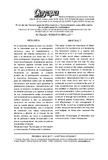| dc.rights.license | http://creativecommons.org/licenses/by-nc-sa/3.0/ve/ | es_VE |
| dc.contributor.author | Rosario Araujo, Alí Ramón | |
| dc.date.accessioned | 2018-09-26T23:38:23Z | |
| dc.date.available | 2018-09-26T23:38:23Z | |
| dc.date.issued | 2016 | |
| dc.identifier.issn | 1317-5734 | |
| dc.identifier.uri | http://www.saber.ula.ve/handle/123456789/45242 | |
| dc.description.abstract | En el presente trabajo se hace una revisión de lo importante que es la participación ciudadana para el mantenimiento y
desarrollo del sistema democrático en un país y la influencia que tienen las TIC en dicha participación. En primer lugar se habla
sobre la participación ciudadana en general, se exponen algunas visiones sobre ello, para luego presentar el rol que cumplen
las TIC para el fomento de la participación. Finalmente se describe el contexto jurídico de la participación ciudadana en
la República Bolivariana de Venezuela, para así determinar cuáles son los distintos mecanismos que existen para garantizar la
participación ciudadana, demostrándose así que es un derecho y un deber ya que quienes no intentan participar y no aportan al trabajo
de sus representantes están incumpliendo con la condición de ciudadanía y con su deber político asociado a ella. La participación
ciudadana, se concibe como un derecho que se puede ejercer particularmente o a través de representantes, con el propósito
de demandar una mayor transparencia, eficiencia y eficacia en el manejo de los fondos públicos, así como el cumplimiento
de las políticas y metas incorporadas a los planes y presupuestos, por parte de quienes representan al Estado. | es_VE |
| dc.language.iso | es | es_VE |
| dc.publisher | SABER-ULA | es_VE |
| dc.rights | info:eu-repo/semantics/openAccess | es_VE |
| dc.subject | Tecnologías de información y comunicación | es_VE |
| dc.subject | Participación ciudadana | es_VE |
| dc.title | El rol de las tecnologías de información y comunicación para el fomento de la participación ciudadana | es_VE |
| dc.title.alternative | The role of the technologies of information and communication for the promotion of the citizen participation | es_VE |
| dc.type | info:eu-repo/semantics/article | es_VE |
| dcterms.dateAccepted | 07/02/2017 | |
| dcterms.dateSubmitted | 20/01/2017 | |
| dc.description.abstract1 | This paper reviews the importance of citizen participation for mantenance and developing the democratic system in a country and the influence of ICT on such participation. First it talks about citizen participation in general, some visions are exposed about it and then present the role that TIC play for the promotion of participation. Finally the legal context of the citizen participation in the Bolivarian Republic of Venezuela is described to determine which the different mechanics are that exist to guarantee citizen participation, demonstrating that it is a right and a duty since those who don’t try to participate and don’t contribute to the work of their representatives are not complying with the condition of citizenship and their political duty associated with it. Citizen participation, is conceived as a right that can be exercised in particular or through representatives, in order to demand greater transparency, efficiency and effectiveness in the management of public funds, as well as compliance with the politics and goals incorporated into the plans and budgets, by those who represent the state. | es_VE |
| dc.description.colacion | 77-94 | es_VE |
| dc.description.email | rosarioa@ula.ve | es_VE |
| dc.identifier.depositolegal | 200102ME988 | |
| dc.identifier.edepositolegal | 201202ME4020 | |
| dc.identifier.eissn | 2244-8446 | |
| dc.publisher.pais | Venezuela | es_VE |
| dc.subject.centroinvestigacion | Centro de Investigaciones para el Desarrollo Integral Sustentable (CIDIS) | |
| dc.subject.facultad | Núcleo Rafael Rangel (NURR) | es_VE |
| dc.subject.institucion | Universidad de Los Andes | es_VE |
| dc.subject.keywords | Technologies of information and communication | es_VE |
| dc.subject.keywords | Citizen participation | es_VE |
| dc.subject.publicacionelectronica | Revista Cayapa | |
| dc.subject.seccion | Revista Cayapa: Artículo | es_VE |
| dc.subject.thematiccategory | Ciencias Económicas y Sociales | es_VE |
| dc.subject.tipo | Revistas | es_VE |
| dc.type.media | Texto | es_VE |


